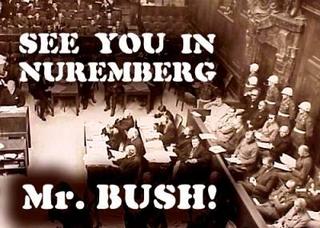
Editor's Note: Robert Thompson, an Axis of Logic columnist, has served as an international lawyer since the 1960s. He continues to consult as a patron with the pan-European charity Fair Trials Abroad (FTA). The FTA helps European Union citizens facing trial in jurisdictions other than their own. He has never stopped studying and reflecting upon many aspects of international law, both public and private. As an authority on international law, we have asked him to write an opinion regarding the possible criminality of George Walker Bush, et. al. The reader will find more about Mr. Thompson's biography and a link to his column at the end of this article. - LMB
The Enemy and the Nuremberg Principles
As we all should know, one of the first significant acts of the infant United Nations Organisation was the setting up of the Nuremberg Tribunal to try former Nazi high officials.
Everyone agreed, as they now do, to say that we should oppose terrorism, that something had to be done about such vile crimes, but it was necessary first to define the offences which were alleged to have been committed.
The Nuremberg Principles
These definitions had been framed to serve as the foundation for the Tribunal which was to be set up in Nuremberg (in German, Nuernberg), a highly significant choice of place since it had served as the site for some of Adolf Hitler's biggest popular triumphs. It was at Nuremberg that Hitler managed to persuade the German people to follow his criminal path. As a result, the rules were called the "Nuremberg Principles" (hereinafter each individually called a "Principle" together with its number). They remain valid as the simple basis for our understanding of what are the most serious crimes under international law.
We now have to oppose terrorism, including massive state terrorism, which makes one ask whether or not the old definitions, dating from 1946, would apply to today's circumstances, with particular reference to the behaviour of the leaders and high officials of nations which are members of the United Nations.
